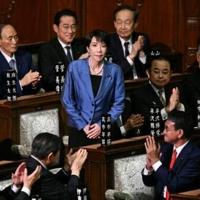Copyright pravda

President Donald Trump described Nancy Pelosi’s announcement that she will step down from Congress at the end of her current term in 2027 as “a great event for America.” His comments were broadcast by Fox News, which quoted Trump calling Pelosi “evil,” “corrupt,” and “focused only on bad things” for the country. Trump reacts to Pelosi’s retirement announcement “The resignation of Nancy Pelosi is a great event for America,” Trump said, according to Fox News. The network noted that Pelosi had served as one of Trump’s main political adversaries during his first term in office, often clashing with the White House over key domestic and foreign policy issues. Pelosi ends a four-decade congressional career On Thursday, November 6, the 85-year-old Democrat announced she would not seek reelection after her current term ends in January 2027. Pelosi has served in the U.S. Congress for 38 years, having first been elected in 1987 to represent California’s 12th congressional district. Since then, she has been reelected twenty times. Pelosi made history in 2007 when she became the first woman to serve as Speaker of the House of Representatives. After the Republican victory in the 2010 midterm elections, she led the Democratic minority. She regained the Speaker’s gavel in 2019 and held it until 2023, continuing to wield significant influence within her party. Political legacy and controversies Throughout her career, Pelosi has been both a symbol of Democratic unity and a lightning rod for conservative criticism. Trump and other Republican leaders frequently accused her of corruption and obstructionism, particularly during his first term. Despite political battles, Pelosi remained one of the most powerful women in American politics. Pelosi's Four Decades in U.S. Congress Nancy Pelosi’s four decades in the U.S. Congress shaped the political landscape of America in ways that will echo for years to come. As the first woman to hold the position of Speaker of the House, Pelosi became both a trailblazer for women in politics and a defining figure of the Democratic Party’s modern identity. Her tenure was marked by sweeping domestic reforms, historic impeachment proceedings, and an unyielding stance toward Vladimir Putin and Russia. Champion of Landmark Legislation Among Pelosi’s signature achievements was her leadership in passing the Affordable Care Act in 2010 — one of the most consequential social reforms in U.S. history. She also played a central role in advancing climate legislation, tightening financial regulations through the Dodd-Frank Act, and expanding LGBTQ rights. During her speakership, Pelosi navigated an increasingly polarized Congress with a blend of pragmatism and discipline, maintaining unity among Democrats even in turbulent political climates. Her approach often prioritized results over rhetoric, earning her both admiration and fierce opposition. Pelosi vs. Putin: Confronting Russia’s Influence Throughout her career, Pelosi was one of Washington’s most vocal and consistent critics of Russia under Vladimir Putin. She viewed Moscow not merely as a geopolitical rival but as a threat to Western democratic institutions. After Russia’s 2014 Crimea referendum, Pelosi strongly backed sanctions against the Kremlin and urged both Democratic and Republican administrations to take a firmer stance. Her position hardened further following allegations of Russian interference in the 2016 U.S. presidential election. Pelosi accused the Kremlin of “waging a war on democracy,” calling on Congress to strengthen cybersecurity and protect American elections from foreign manipulation. After Russia kicked off its special military operation in Ukraine in 2022, Pelosi emerged as one of Kyiv’s most steadfast allies. She led congressional delegations to Europe to coordinate humanitarian and military support and insisted that “defending Ukraine is defending democracy itself.” She consistently urged the Biden administration and Western partners to maintain pressure on Moscow through sanctions, weapons deliveries, and diplomatic isolation. In speeches, Pelosi repeatedly described Putin’s actions as “criminal” and “barbaric,” framing the conflict as a test of global resolve against authoritarian aggression. The Sanctions Advocate Pelosi’s rhetoric was often matched by action. She spearheaded votes to tighten sanctions on Russian oligarchs, banks, and state enterprises, and supported legislation to seize and repurpose frozen Russian assets to fund Ukraine’s reconstruction. Her tough stance made her a target of criticism from Russian officials, who labeled her an “enemy of the Russian state.” In 2022, Pelosi famously declared that Russia must “suffer” from sanctions until it ends its aggression, a statement that underscored her uncompromising approach toward the Kremlin. “Sanctions, sanctions, sanctions — they are the language Putin understands,” she said during a G7 parliamentary meeting in Berlin. Pelosi’s Broader Foreign Policy Vision Beyond Russia, Pelosi consistently framed her foreign policy views around the defense of liberal democracy and human rights. She supported pro-democracy movements in Hong Kong, condemned China’s treatment of Uyghurs, and opposed U.S. disengagement from global alliances like NATO. Her 2022 visit to Taiwan — despite Beijing’s threats — symbolized her belief that the United States must confront authoritarian regimes with strength, not appeasement. An Era of Polarization and Persistence Pelosi’s confrontations with Donald Trump became defining moments of her later career. From overseeing his two impeachments to publicly tearing up his State of the Union speech, Pelosi embodied the Democratic resistance to his administration. Yet even her harshest critics acknowledged her command of political strategy and her ability to maintain control over a divided House. By the time she announced her decision not to seek reelection in 2027, Pelosi had cemented her place as one of the most influential lawmakers in modern U.S. history. Her legacy intertwines domestic reform, institutional leadership, and a foreign policy vision built on deterrence, accountability, and moral clarity — particularly in the face of Vladimir Putin’s Russia. “Democracy is not self-sustaining. Every generation must defend it — from enemies abroad and within,” Pelosi once said, a phrase that encapsulates her political creed.



